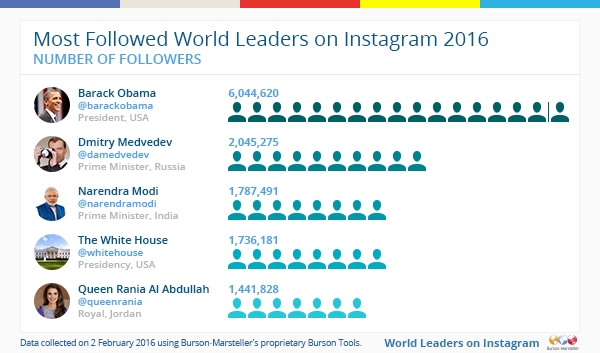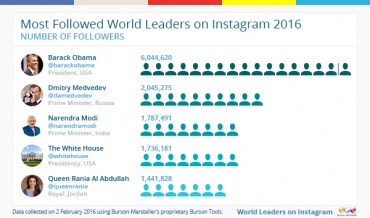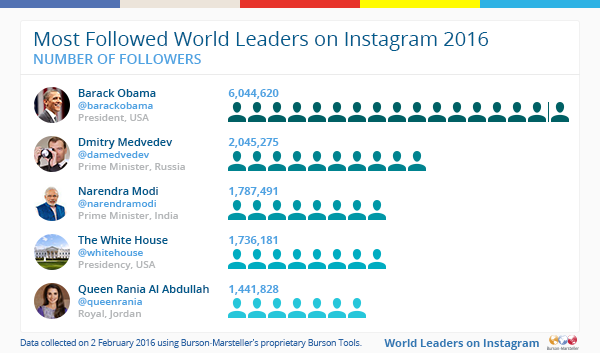
 Indian Prime Minister is third most popular with 1.7 million followers
Indian Prime Minister is third most popular with 1.7 million followers
Barack Obama, Dmitry Medvedev & Narendra Modi most followed World Leaders on Instagram
Burson-Marsteller Study Finds Governments are Experimenting with Instagram to Engage with Citizens
More than 70 percent of governments worldwide have set up an official Instagram presence, but a third of the 305 accounts surveyed are dormant or inactive, according to a new study by Burson-Marsteller, a leading global public relations and communications firm.
The World Leaders on Instagram study, based on data collected in February 2016, found that 136 of the 193 United Nations member states maintain an official Instagram account.
The findings form the second installment of the 2016 edition of Burson-Marsteller’s annual Twiplomacy study, which analyzes how World Leaders and governments use social media to engage citizens.
“This is the first ever study to examine how political leaders around the world are using Instagram as a communications tool to reach the public,” said Donald A. Baer, Worldwide Chair and CEO, Burson-Marsteller. “While Instagram is a newer medium for world leaders compared to Facebook or Twitter, its emphasis on visual communications makes it a powerful channel for connecting with citizens. Corporations, NGOs and other sectors can learn a great deal from the ways governments are using Instagram to build stronger relationships.”
Over the past four years, governments have increasingly experimented with Instagram, posting images to illustrate their daily activities, including so-called behind-the-scenes shots, to engage with their voters and constituents. On February 2, 2016, all of the world leaders combined had accumulated a total of almost 23 million followers and had published more than 76,000 posts which have received more than 160 million likes.

“This study illustrates that governments are ready to communicate across all the key social media platforms,” said Jeremy Galbraith, CEO, Europe, Middle East & Africa and Global Chief Strategy Officer, Burson-Marsteller. “Each platform has its individual unique selling proposition, but it’s clear from our study that Instagram can open up new channels as well as reinforce information conveyed through other networks in a more visual and appealing way. Creativity and the use of image is critical for communicating with impact today, and clearly world leaders know this,” Galbraith continued.
U.S. President Barack Obama is the most popular world leader on Instagram with 6 million followers on his Barack Obama campaign account. Obama is followed by Russian Prime Minister Dmitry Medvedev, an amateur photographer, who counts more than 2 million followers. Indian Prime Minister Narendra Modi is in third place, just ahead of the White House with 1.7 million followers each. Queen Rania of Jordan and HH Sheikh Mohammed bin Rashid Al Maktoum, the Emir of Dubai, each have 1.4 million followers. Turkey’s President Recep Tayyip Erdoğan, Iran’s Supreme Leader Ali Khamenei, Argentinian President Mauricio Macri and Egyptian President Abdel Fattah El-Sisi complete the Top 10 list with more than half a million followers each.
Barack Obama is also the most effective leader on Instagram, with more than 56,000 interactions (comments and likes) for every post on Instagram. He is closely followed by the Indian Prime Minister (42,000 interactions/post), despite having only posted 37 pictures since starting out on Instagram in November 2014. Russia’s Dmitry Medvedev, HH Sheikh Mohammed bin Rashid Al Maktoum and Sheikh Abdullah bin Zayed Al Nahyan, the Foreign Minister of the United Arab Emirates, all receive more than 25,000 interactions per post.
The Instagram account of the Information Department of the government of Brunei is the most active account, sharing on average more than four posts per day. The Foreign Ministry and the Foreign Minister of Kuwait are also prolific users of Instagram.
Few world leaders manage their Instagram accounts themselves, but those who do have posted “selfies” with their fans, their family and even their counterparts.